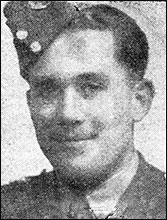 |
|
Major Allebone
|
Northamptonshire Evening Telegraph. Tues., Feb. 6. 1945
Fighting Nazis By Floodlight
COMMANDING a searchlight battery, which lights the ground for our troops at night in the forward area in Italy, is a Rushden officer, Major Alan Allebone, R.A., second son of Ald. Arthur Allebone, J.P., and Mrs. Allebone, of Rushden, where his wife also resides.
The British public first heard of the new "artificial moonlight" in the winter of 1944, when ft was put into operation on the 8th Army front in Italy. It was a new use of searchlights in a ground role, being played on the sky above the forward troops, to assist them in seeing as well at night as they did during the day. The innovation was made possible by the withdrawing from purely anti-aircraft duties of the 400 Searchlight Battery, R.A., and their subsequent changing from their original and intended role to that of field support.
The battery was originally part of the Northamptonshire Regiment, whose badge they still wear in their caps, and from their embodiment in the Regular Army, from Territorial days, they became part of the Royal Engineers' searchlight organisation.
Later in the first year of war, they were taken under the wing of the Royal Artillery, and after playing a very active part in air defence throughout the Battle of Britain, they found themselves in a convoy bound for North Africa, in November, 1942.
They landed at Algiers, where one of the ships carrying equipment was torpedoed in harbour. This equipment stayed under water for five days, was salvaged, cleaned, and is still in use with the battery. After defence work at Algiers aerodrome, Maison Blanche, Blida and Bizerta, they went to Italy, where the battery became independent.
Foggia and its airfields, Bari and its docks, all had their share of the searchlights. Then the battle for Bologna began, and, on October 30th, 1944, the battery moved into positions behind the front line troops, where they have been in action ever since without a moment's break.
Still, in the worst of all weathers, the boys continue their work. There are times, very often, when the German guns bear down on the light positions, causing damage to the cables and wires which control the lights, but they are soon repaired and there is scarcely a minute when the light is out at night. Night bombing of tactical targets and mine lifting are also done by the light of these powerful searchlights.
So useful are the lights in assisting sappers to build bridges by night that one bridge was named "Moonlight Bridge" in their honour. During heavy shelling by the enemy, the lights came in very useful in lighting the road for evacuation of civilian women and children.
These are the men who work by night—the men who enable the infantry, the sappers, the gunners and the other front line troops to work at night Major Allebone is one of the founder members of the unit, having been with the old battalion in Territorial days.
His brother, Lieut. Gus Allebone, is in the front line in Burma, having spent ... and a half years abroad.
|